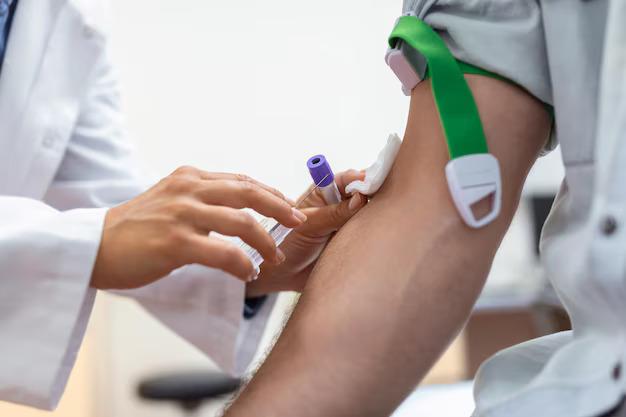Blood tests are one of the most common medical procedures. They might seem intimidating, but understanding what happens and what they reveal can empower you to take charge of your health. So, let’s dive into the world of blood tests and shed some light on this essential tool!
Why get a blood test?
Blood tests are like detectives, gathering clues about your inner workings. Doctors use them for various reasons, including:
- Routine Checkups: These check your overall health, monitoring cholesterol, blood sugar, and other vital components.
- Diagnosing Conditions: Blood tests can reveal signs of infection, anaemia, and even certain cancers.
- Monitoring Existing Conditions: If you have diabetes or high blood pressure, blood tests track progress and treatment effectiveness.
The Blood Draw: A Step-by-Step
Blood sample collection is typically done by a healthcare professional at a clinic or hospital. Here’s a basic rundown of what to expect:
- Registration: You’ll register and discuss the test with your doctor or nurse.
- Arm Prep: A band will be placed around your upper arm to locate a vein.
- Needle Insertion: A thin needle is inserted into your vein to draw the blood sample. You might feel a slight prick.
- Sample Collection: The blood is collected in a vial or tube.
- Bandage Application: A bandage is applied to the puncture site.
The whole process usually takes just a few minutes. Some people might feel a little lightheaded or experience minor discomfort, which is perfectly normal.
What can blood tests reveal?

Blood is a complex mixture of cells, chemicals, and proteins. By analysing these components, doctors gain valuable insights into your health. Here are some areas blood tests can illuminate:
- Cell Counts: These measure the different types of blood cells, including red blood cells (which carry oxygen), white blood cells (which fight infection), and platelets (which aid clotting). Abnormal counts can indicate anaemia, infection, or bleeding disorders.
- Chemistry Panel: This checks various chemicals in your blood, like electrolytes (maintain fluid balance), glucose (blood sugar), and cholesterol. Levels outside the normal range could suggest diabetes, kidney problems, or heart disease risk.
- Thyroid Function Tests: These assess the thyroid gland’s activity, which regulates metabolism and energy levels.
- Liver Function Tests: These evaluate liver health and function.
- Immunology tests: These check your immune system’s response to infections or allergies.
- Tumor markers: These can indicate the presence of certain cancers but are not definitive on their own.
Understanding Your Results
Blood test results are reported as numbers or values, often with a reference range indicating the normal level. Your doctor will interpret the results based on your medical history, symptoms, and other tests.
Here are some key things to remember:
- Not all abnormal results equal a medical condition. Sometimes, external factors like diet or medication can temporarily affect results.
- Your doctor will explain your results. Don’t hesitate to ask questions if something is unclear.
- Blood tests are often just one piece of the puzzle. Additional tests or examinations might be needed for a complete diagnosis.
Beyond the Basics
Blood tests are a safe and valuable tool. Here are some additional points to consider:
- Fasting: Certain tests require fasting beforehand. Your doctor will advise you if necessary.
- Hydration: Staying well-hydrated before a blood test can make the process smoother.
- Preparing mentally: If you’re anxious about needles, let the healthcare professional know. They can offer relaxation techniques.
Hemogram Blood Test
Hemogram blood test is a common type of blood test that measures the different types and quantities of blood cells in your body. It’s often included in routine checkups and can help identify a variety of conditions, such as anemia, infection, or inflammation.
MCV, MCH, and What They Mean: Decoding Red Blood Cell Size and Haemoglobin
Two important measurements included in a complete blood count (CBC) are MCV (mean corpuscular volume) and MCH (mean corpuscular haemoglobin). These values provide information about the size and haemoglobin content of your red blood cells.
- MCV: This indicates the average size of your red blood cells.
- MCH: This reflects the average amount of haemoglobin within a red blood cell. haemoglobin is the protein in red blood cells that carries oxygen throughout your body.
When MCV and MCH Are High: Understanding the Potential Causes
If your blood test results show elevated MCV and MCH, it could be a sign of macrocytosis. This means your red blood cells are larger than normal. Here are some potential causes of high MCV and MCH:
- Vitamin B12, or folate deficiency: These vitamins are essential for red blood cell production. A deficiency can lead to larger, less mature red blood cells.
- Liver disease: Liver problems can affect red blood cell production, resulting in macrocytosis.
- Alcohol abuse: Chronic alcohol consumption can interfere with vitamin B12 absorption and red blood cell production.
- Bone marrow disorders: Certain conditions affecting the bone marrow, where red blood cells are produced, can cause macrocytosis.
- Medications: Some medications can have the side effect of raising MCV and MCH.
It’s important to note that high MCV and MCH don’t always indicate a medical condition. Other factors, like recent blood loss or pregnancy, can temporarily affect these values.
Remember: Knowledge is power! By understanding blood tests, you can approach them with confidence and actively participate in your healthcare journey.
Blood test at home service is an increasingly popular option for those who prefer the convenience of having their blood drawn at home. This service typically involves a healthcare professional visiting your home to collect the blood sample with different blood test packages.



